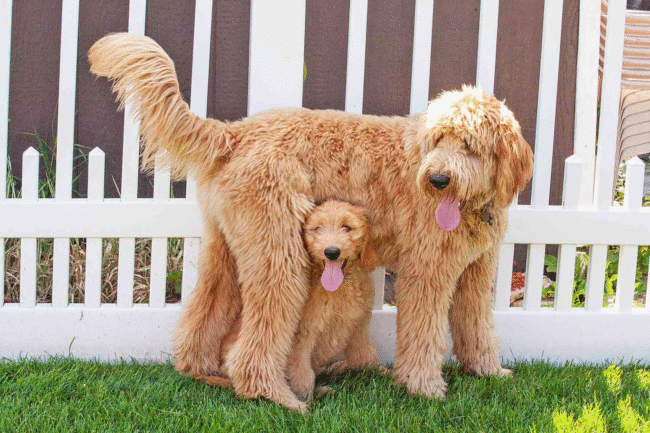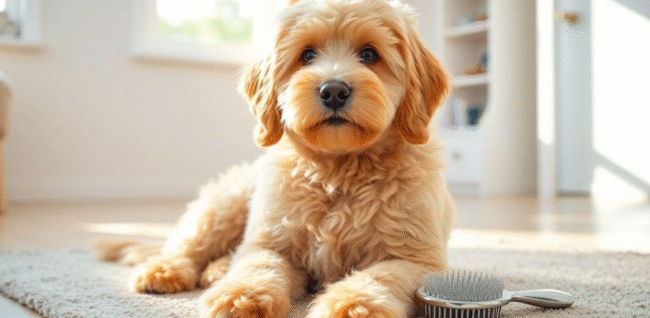
The Truth About Goldendoodles and Allergies
So, Goldendoodles and allergies, huh? It’s a big topic. Goldendoodles are often called “hypoallergenic,” but what does that even mean? It’s all about their coat and how much they shed.
Basically, Goldendoodles are a mix of Poodles and Golden Retrievers. Poodles are known for their low-shedding coats, and that’s where the hypoallergenic idea comes from. But it’s not a guarantee.
No dog is truly 100% hypoallergenic. It’s more about reducing allergens. Goldendoodles can be a better choice for some allergy sufferers, but it’s not a one-size-fits-all thing.
Goldendoodles and Allergy Sufferers
Do Goldendoodles actually help with allergies? Well, it’s complicated. Some people with allergies do fine with them, while others still have issues. It really depends on the person and the dog.
The curlier the coat, the less shedding there is likely to be. This is why many allergy sufferers find Goldendoodles to be a good fit. But remember, every dog is different.
Here’s a quick look at how Goldendoodles compare to other breeds:
| Breed | Coat Type | Shedding Level | Allergen Level |
| Goldendoodle | Wavy to Curly | Low to None | Lower |
| Regular Dog Breed | Varies | Moderate to High | Higher |
Key Elements
What makes a Goldendoodle more or less hypoallergenic? It’s a mix of genetics and coat type. The more Poodle in the mix, the less likely they are to shed. But even then, it’s not a sure thing.
Here are some things to keep in mind:
- Coat type matters a lot. Curly coats are usually better.
- Spending time with a dog before bringing it home is crucial.
- Breeder knowledge is key. A good breeder can tell you about the dog’s lineage and potential for shedding.
Ultimately, finding the right Goldendoodle for an allergy-sensitive home takes research and patience. Don’t rush into it!
Goldendoodles in Allergy-Prone Families: A Compatible Pet Choice
Goldendoodles often fit right into families. Especially those dealing with allergies. Their reputation for being hypoallergenic helps a lot.
They’re usually friendly and can adapt to different homes. This makes them good pets for various lifestyles.
Goldendoodles are known to be gentle. This makes them great friends for kids and other pets.
Behavioral Aspects in Families
Goldendoodles often have a low-shedding coat. This is a big plus for families with allergies.
They tend to get along well with kids and other animals. Their friendly nature makes them good family pets.
Socializing them early can help reduce stress. Less stress can mean less shedding.
Family Compatibility Rating Table
| Trait | Rating |
| Friendliness | High |
| Adaptability | Very High |
| Energy Level | Moderate |
Raising Tips for an Allergy-Friendly Environment
Keep the house clean. Regular cleaning helps reduce allergens.
Regular grooming is key. It helps manage shedding and dander.
Wash your hands after playing with your Goldendoodle. This helps reduce allergen transfer.
The Unique Allure of Goldendoodles: Hypoallergenic and Beyond

Key Traits
Goldendoodles are more than just hypoallergenic dogs. They have a special mix of traits. It’s the smarts of a Poodle mixed with the friendly nature of a Golden Retriever.
They’re great family pets because of this mix. Goldendoodles can be therapy dogs, assistance dogs, or just loving friends.
Goldendoodles are known for being friendly and easy to get along with. This makes them good in social situations and with people of all ages.
Behavioral Assessment Table for Hypoallergenic-Friendly Behavior
How do you know if a Goldendoodle will be good for allergies? Look at their behavior. Some behaviors can help reduce allergens.
Here’s a simple table to help you assess:
| Behavior | Importance | Notes |
| Low Shedding | High | Less hair means less dander. |
| Trainability | Medium | Easier to train to stay off furniture. |
| Calm Temperament | Medium | Less running around means less stirred-up allergens. |
| Regular Grooming | High | Regular brushing reduces shedding and dander. |
Advice for Selecting a Puppy for Allergic Homes
Choosing the right puppy is key. Look for breeders who focus on health and hypoallergenic traits. It makes a big difference.
Here are some tips:
- Visit the breeder’s location to see the environment.
- Meet the puppy’s parents if possible.
- Ask about the puppy’s health history.
Grooming for Allergy Management

Grooming Tips for Allergy-Sensitive Owners
Grooming is super important. It’s not just about looks. It’s about keeping allergies at bay. Regular brushing is key. It stops mats from forming. Mats trap allergens.
Bathing helps too. Use hypoallergenic shampoo. It keeps their skin healthy. Healthy skin means fewer allergens.
Don’t forget nails, ears, and teeth. These also need care. It’s all part of the allergy management plan.
Maintaining a Low-Allergen Home
Keep your house clean. Vacuum often. Focus on places your Goldendoodle hangs out. This reduces allergens in the air.
Wash your dog’s bedding often. This gets rid of dander. Dander is a big allergy trigger.
Air purifiers can help. They filter out allergens. This makes the air cleaner.
A clean home is a happy home, especially for allergy sufferers. Regular cleaning and air purification can significantly reduce allergen levels.
Professional Grooming Benefits
Consider a pro groomer. They have the right tools. They know how to handle Goldendoodle coats.
They can do deep cleaning. This gets rid of more allergens. It’s a big help for allergy management.
Pro groomers can also spot skin issues. Early detection is key. It prevents bigger problems.
Goldendoodle Temperament and Family Integration
Compatibility with Children and Other Pets
Goldendoodles are known for their friendly nature. They usually get along great with kids. This makes them a solid choice for families.
They also tend to play well with other pets. Early introductions are still important, though. A well-socialized Goldendoodle is a happy addition.
Consider the energy levels of all pets. This helps ensure a harmonious household.
Socialization for a Harmonious Home
Socialization is key for any dog. It’s especially important for Goldendoodles. Early exposure to different people and places helps.
This reduces anxiety and unwanted behaviors. A well-socialized Goldendoodle is more adaptable. They’re less likely to be stressed in new situations.
Socialization should start early. It should continue throughout the dog’s life. This ensures they remain well-adjusted.
Intelligence and Trainability
Goldendoodles are smart dogs. They inherit intelligence from both Poodles and Golden Retrievers. This makes them highly trainable.
They respond well to positive reinforcement. Training sessions should be fun and engaging. Consistency is important for success.
Consider enrolling in obedience classes. This can help strengthen the bond between you and your dog.
Selecting Your Goldendoodle Puppy
Researching Reputable Breeders
Finding a good breeder is key. It helps ensure you get a healthy, well-adjusted Goldendoodle pup. Look for breeders who do health testing on their dogs.
Good breeders will also let you visit their facilities. This way, you can see how the dogs are cared for. They should be knowledgeable and willing to answer your questions about the breed.
Breeders should be transparent about the Goldendoodle pups ready for adoption’s lineage and health history.
Understanding Genetic Makeup and Coat Types
Genetic makeup plays a big role in a Goldendoodle’s coat. Different generations (F1, F1B, F2, etc.) have varying percentages of Poodle and Golden Retriever genes. This affects shedding and hypoallergenic potential.
Wavy or curly coats are generally lower shedding. Straight coats tend to shed more. Ask the breeder about the expected coat type of the puppy.
Consider the size of the adult dog. Goldendoodles come in mini, medium, and standard sizes. Choose one that fits your lifestyle and living space.
Preparing for Your New Family Member
Before bringing your Goldendoodle pups ready for adoption home, get everything ready. This includes food, water bowls, a bed, toys, and grooming supplies.
Make sure your home is safe for a puppy. Remove any hazards like toxic plants or loose electrical cords. Set up a designated potty area.
Start thinking about training and socialization. Early training is important for a well-behaved dog. Socialize your puppy with different people, dogs, and environments.
Conclusion
So, Goldendoodles really stand out as a great choice for families where allergies are a problem. Their special coats, which don’t shed much, can make a big difference for people who usually react to dogs. But it’s not just about the fur; these dogs are also super friendly and smart, which makes them awesome family pets. They get along well with kids and other animals, and they’re pretty easy to train. If you’re looking for a dog that brings a lot of joy without all the sneezes and itchy eyes, a Goldendoodle might just be the perfect fit for your home. Just remember to do your homework and find a good breeder!
